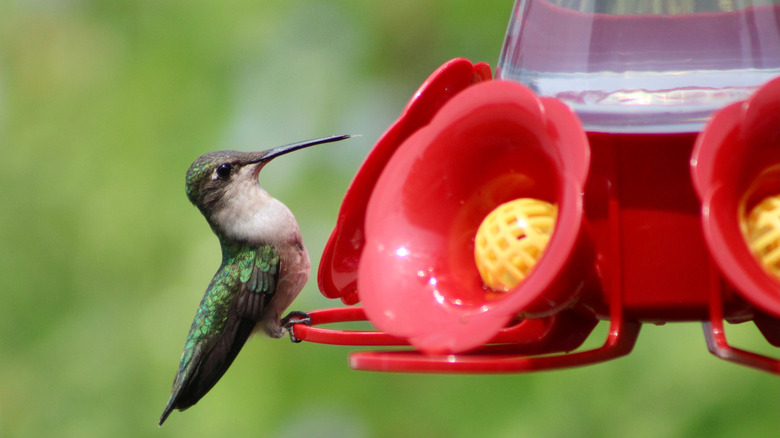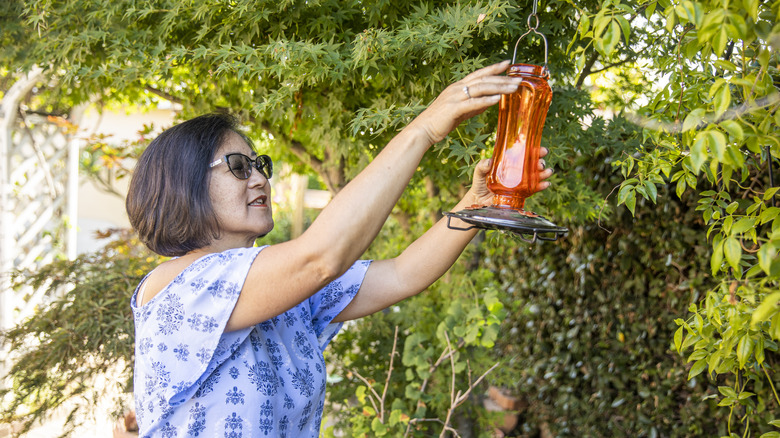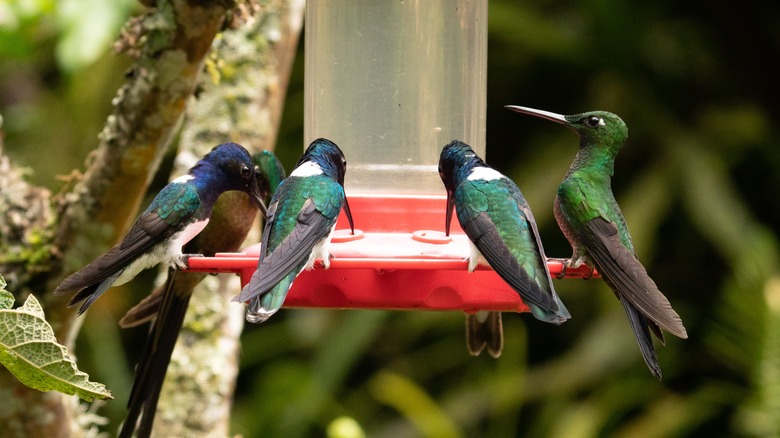Why Hummingbirds Stop Visiting Your Feeder After Rain
We may receive a commission on purchases made from links.
Hummingbirds are one of the most interesting birds to watch because of their tiny bodies, brilliant plumage, and almost-invisible flapping wings. Their presence could be described as mystical because it's so easy to miss them due to their speed and size. For the bird lovers out there, setting up a feeder to watch these little beauties flutter in and out day after day is a reward all on its own. However, the joy you get from gazing at them can quickly turn into disappointment when they stop showing up, especially after a very long rain shower. If you've ever wondered why the hummingbirds in your area go MIA and stop visiting your feeder after a storm, then you might want to check what's actually inside the feeder after it rains.
When it rains, if your feeder is cracked or low-quality, the sugary solution you left inside could receive a large amount of rainwater, which can actually be toxic for hummingbirds. The feeder could also become broken or damaged by heavy winds, making it unusable. Another byproduct of heavy rain is that the spilled nectar can get overrun by insects, which can in turn discourage birds from drawing near. Hummingbirds won't want to visit if their source of food has been compromised. Nevertheless, there are steps you can take to fix this messy situation when it arises.
Precautions to take with your hummingbird feeder
If you find that the nectar in your hummingbird feeder has been contaminated with rainwater, then your feeder is likely either damaged or substandard. A quality option may cost more than a cheap one, but it will hold up better in the long run. You are better off investing in a weather-resistant type that can stand the rage of the elements. You should also opt for feeders with more weight so that they are less likely to blow away during a windy day, and search for ones that are insect-proof as well.
You can also take the initiative and not wait for the rain to hurl your feeder across the garden like a ragdoll. Keeping up with forecasts to know ahead of time when storms will be rolling in so you can take down the feeder until they pass is always a good idea. Also, the location you choose matters, and it's best to place it where a strong breeze won't find it. If your feeder is made of a light material like plastic, you can try filling it up with more nectar. The heavier it is, the more resistant it will be to wind. Because hummingbirds like to return to a trusted source of food, once they know their feeder is safe and reliable, you won't have to worry about not seeing them for the season.
How to attract hummingbirds to your feeder again
Once you figure out why the hummingbirds are steering clear of your yard, you will need to reactivate their interest. There are a few ways you can gain their trust back. Hummingbirds are attracted to feeders that are brightly-colored. If you want them to approach your feeder, try using a nice, bright red color to mimic some of the flowers they usually feed from. While this, coupled with the weather and bug-resistant features, may seem like a lot to check off your ideal feeder list, it's not impossible to acquire. For example, the Perky Pet Hummingbird Feeder on Amazon not only contains a moat to keep out ants and bees, but it is also weather-resistant, a bright red color, and is easy to take apart for cleaning.
Additionally, the quality of the nectar that you have laid out for the birds is also crucial. Luckily for you, it's easy to drum up food that will suffice. A simple water to white sugar solution with the ratio 4:1 will have the birds flocking right back. Just be sure not to use honey or raw brown sugar because they are harder for them to digest than white sugar. You can also use tap water to make the solution, but ensure it's filtered to get rid of any impurities.


